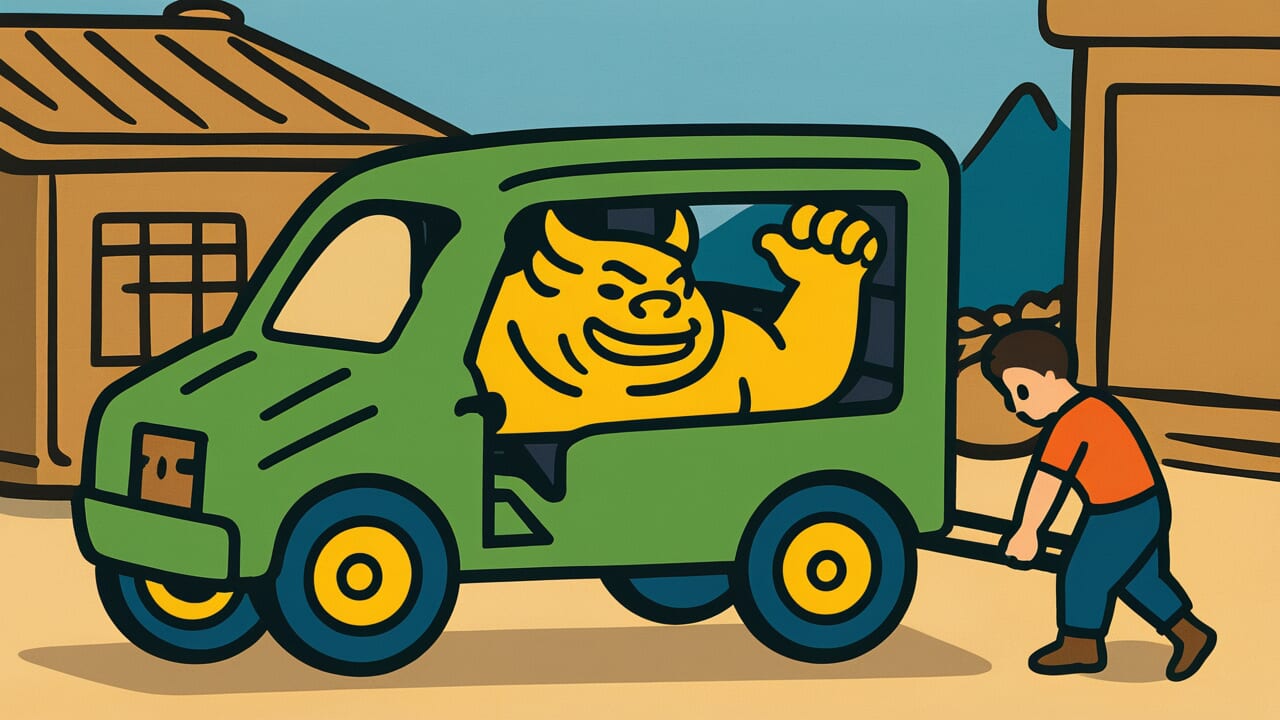How to Read “Loading demons onto a single cart”
Oni wo issha ni nosu
Meaning of “Loading demons onto a single cart”
“Loading demons onto a single cart” is a metaphor for gathering bad people in one place. The powerful image of loading multiple terrifying demons onto a single cart describes situations where bad people are concentrated together, or dangerous places that should be avoided.
This proverb expresses the unique atmosphere and danger created when bad people gather. One bad person is troublesome enough, but when they form a group, the danger multiplies.
It’s used to critically describe situations where problematic individuals gather in a specific organization or place.
Even today, this phrase effectively describes organizations where dishonest people gather or groups filled with troublemakers. It also carries a warning meaning, alerting good people to places and situations they should avoid.
Origin and Etymology
The exact first appearance of this proverb in literature is unclear. However, the structure of the phrase reveals an interesting background.
In traditional Japanese folk beliefs, “oni” (demons) were the most feared beings. Demons with horns and tiger-skin loincloths symbolized disaster and evil throughout Japanese storytelling.
The expression of “loading onto a single cart” such terrifying demons contains a powerful image of concentrating evil and fear in one place.
In ancient Japan, ox-carts and cargo carts were used to transport criminals. The sight of multiple criminals loaded onto one cart must have been striking to people.
This real-life scene likely merged with the folk image of demons to create this proverb.
From medieval to early modern times, the fear of places where bad people and outlaws gathered was rooted in people’s daily lives. As a metaphor for thieves’ dens and lawless areas that good people wanted to avoid, this comparison was persuasive.
By using the supernatural being of demons, the proverb expresses something more than just a gathering of bad people. It captures an unapproachable terror that makes this saying distinctive.
Usage Examples
- That department has become like loading demons onto a single cart, with all the problem employees being transferred there
- When I saw the list of executives in the organization exposed for fraud, I thought this is exactly what loading demons onto a single cart means
Universal Wisdom
The proverb “Loading demons onto a single cart” contains the universal truth that “birds of a feather flock together.” However, it shows not just gathering through affinity, but the more serious human tendency of evil attracting evil.
Why do bad people gather together? Because those who share the same values feel comfortable with each other.
Actions that would cause guilt in good society become justified when similar people gather, even celebrated. What one person might hesitate to do alone becomes bold in a group.
This is the negative side of human group psychology.
This proverb has been passed down through generations because people understood this danger through experience. Places where evil concentrates have the power to corrupt those involved even further.
The truth that environment shapes people was expressed by our ancestors using the symbolic figure of demons.
At the same time, this proverb serves as a warning. Don’t approach places where bad people gather, because if you stay there, you’ll be influenced too.
It contains a deep insight into human weakness—that environmental forces can sometimes overcome individual will. This is a harsh but realistic understanding of human nature.
When AI Hears This
Looking mathematically at the situation of loading multiple demons onto one cart reveals a surprising fact. The magnitude of risk doesn’t increase through simple addition, but multiplies exponentially.
For example, let’s say the probability of one demon going wild is 50 percent. If you load two demons on separate carts, the probability of both going wild simultaneously is 25 percent (0.5×0.5).
But when loaded on one cart, the moment one demon goes wild, it likely stimulates the other to do the same.
Expressed as a correlation coefficient, separate carts approach 0, but the same cart approaches 1.0. In other words, a chain reaction occurs where one’s rampage triggers the other’s.
Even more interesting is the amplification effect created by the “container constraint” of the cart. Demons confined in a narrow space physically interfere with each other’s movements.
It’s like “liquidity risk” in finance—when one asset crashes, other assets in the same portfolio must be sold, expanding the loss.
The essence of this metaphor lies in the “loss of independence” of risks. When problems are concentrated in one place, their individual uncertainties influence each other.
The probability of unpredictable catastrophe rises exponentially. People in the Edo period intuitively understood this nonlinear risk amplification.
Lessons for Today
What this proverb teaches modern people is the importance of choosing your environment. Where you place yourself and who you spend time with directly affects your character development.
At work, at school, or in communities, you need to be cautious of places where only problematic people gather.
Even if you initially think “I’ll be fine,” environmental forces are stronger than you imagine. Bad habits and ways of thinking spread without you noticing.
At the same time, this proverb offers important insights for those managing organizations. Gathering problematic personnel in one place doesn’t solve problems.
Rather, it risks worsening the situation. Balanced personnel placement is essential for maintaining healthy organizational culture.
Take a look at the environment you’re in now. Is it a place where you can grow? If you feel uncomfortable, you may need the courage to change your environment.
Placing yourself in a good environment is the first step to protecting yourself and walking a better life path.



Comments